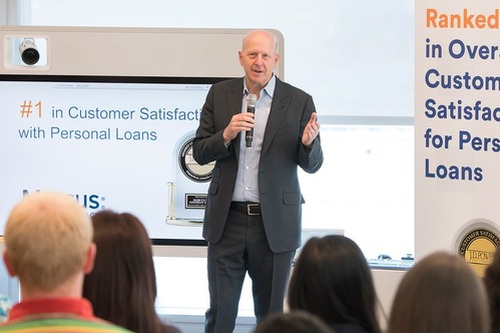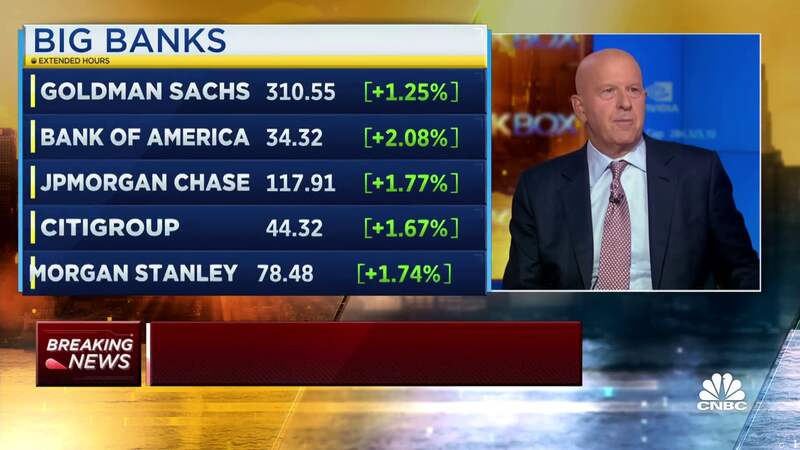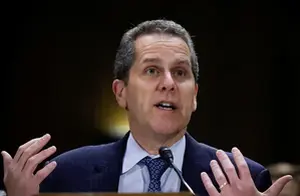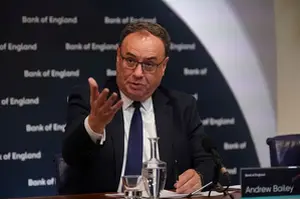
Goldman's pivot away from money-losing Marcus shows that disrupting retail banking is hard
Goldman Sachs CEO David Solomon is reining in his ambition to make the 153-year-old investment bank a major player in U.S. consumer banking.
After product delays, executive turnover, branding confusion, regulatory missteps and deepening financial losses, Solomon on Tuesday said the firm was pivoting away from its previous strategy of building a full-scale digital bank.
Now, rather than "seeking to acquire customers on a mass scale" for the business, Goldman will instead focus on the Marcus customers it already has, while aiming to market fintech products through the bank's workplace and wealth management channels, Solomon said.
The moment is a humbling one for Solomon, who seized on the possibilities within the nascent consumer business after becoming CEO four years ago.
Goldman started Marcus in 2016, named after one of the bank's cofounders, to help it diversify revenue away from the bank's core trading and advisory operations. Big retail banks including JPMorgan Chase and Bank of America enjoy higher valuations than Wall Street-centric Goldman.
Scrutiny from analysts
Instead, after disclosing the strategic shift and his third corporate reorganization as CEO, Solomon was forced to admit missteps Tuesday during an hour-plus long conference call as analysts, one after another, peppered him with critical questions.
It began with Autonomous analyst Christian Bolu, who pointed out that other new entrants including fintech startup Chime and Block's Cash App have broken through while Goldman hasn't.
"One could argue that there's been some execution challenges for Goldman in consumer; you've had multiple leadership changes," Bolu stated. "Looking back over time, what lessons have you guys learned?"

Another analyst, Brennan Hawken of UBS, told Solomon he was confused about the pivot because of earlier promises related to coming products.
"To be honest, when I speak with a lot of investors on Goldman Sachs, very few are excited about the consumer business," Hawken said. "So I wouldn't necessarily say that a pulling back in the aspirations would necessarily be negative, I just want to try and understand strategically what the new direction is."
After Wells Fargo's Mike Mayo asked whether the consumer business was making money and how it stacked up against management expectations, Solomon conceded that the unit "doesn't make money at the moment." That is despite saying in 2020 that it would reach breakeven by 2022.
Troubles with Apple
Even one of the bank's successes — winning the Apple Card account in 2019— has proven less profitable than Goldman executives expected.
Apple customers didn't carry the level of balances the bank had modeled for, meaning that it made less revenue on the partnership than they had targeted, Solomon told Morgan Stanley analyst Betsy Graseck. The two sides renegotiated the business arrangement recently to make it more equitable and extended it through the end of the decade, according to the CEO.
With his stock under pressure and the money-losing consumer operations increasingly being blamed, internally and externally, for its drag on operations, Solomon appeared to have little choice than to change course.
Selling services to wealth management customers lowers customer acquisition costs, Solomon noted. In that way, Goldman is mirroring the broader shift in fintech, which occurred earlier this year amid plunging valuations, as growth-at-any cost changed to an emphasis on profitability.
Despite the turbulence, Goldman's adventure in consumer banking has managed to collect $110 billion in deposits, extend $19 billion in loans and find more than 15 million customers.
"There's no question that the aspirations probably got, and were communicated in a way, that were broader than where we're now choosing to go," Solomon told analysts. "We are making it clear that we're pulling back on some of that now."






